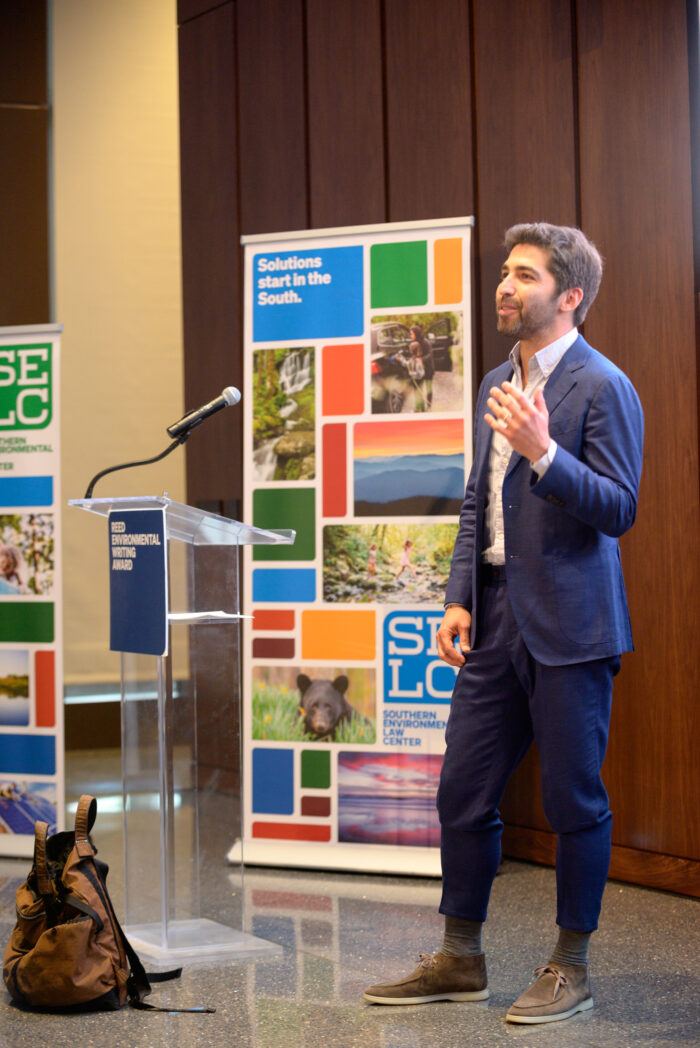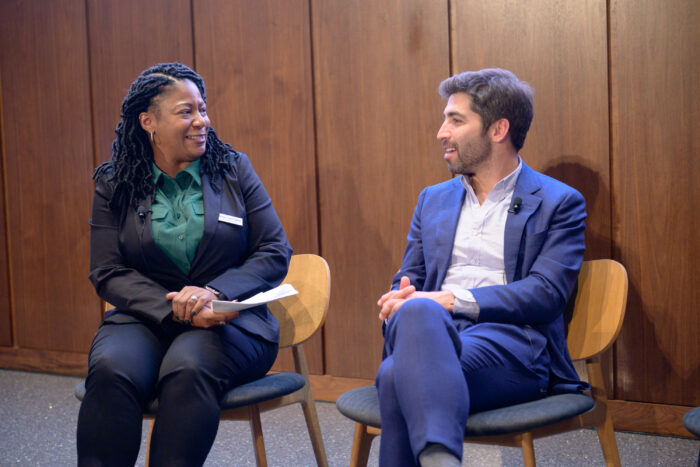Climate journalist Jonathan Vigliotti on the power of storytelling
Jonathan Vigliotti is no stranger to the climate crisis. The award-winning journalist travels the globe documenting the impacts of climate change from Sri Lanka and the Arctic Circle to right here in the South. He chronicles his adventures in his new book, “Before It’s Gone: Stories From The Front Lines of Climate Change in Small-Town America.”
The decorated climate reporter recently joined SELC for the 30th annual Phillip D. Reed Environmental Writing Award ceremony as part of the Virginia Festival of the Book to recognize the work of other extraordinary writers who are calling attention to the most important environmental issues facing the South.

We sat down with Vigliotti before the ceremony to discuss his passion for storytelling, his mission to raise awareness about climate change, and his message to those who continue to ignore our changing world.
What inspired you to write “Before It’s Gone?”
I’ve always loved the natural world and I’ve always been driven to stories about our environmental crossroads. Storytelling is this powerful tool that allows us to connect the dots between, in this case, climate change and its impact on our communities.
Early on, I wasn’t so good at connecting those dots. I was very distracted covering what the weather was. Over time, the more I was telling these stories, the clearer the connections became. These are not isolated, singular events. They’re all interrelated, they’re all connected to climate science, which can sometimes be abstract. I was inspired through what I was seeing to really focus on those stories of environmental disaster. I thought if I could invite readers into my world, I could play my own small role in connecting those dots for them.
Why is it important to report on climate change?
Because the more we report, the more we can help other people open up their eyes to something that I think is easy to ignore. I think it’s important for us to continue to make the idea of climate change less abstract and more understandable.
It’s not just about imagining the worst-case scenario, but imagining a more sustainable way forward.
Do you have any other tips on how to make it more approachable?
For me personally, talk to me like I’m stupid. Make things easy to connect and speak plainly. I really do think it is that simple.
When we talk about climate change being this abstract idea, it can be overwhelming. Where do you even begin? The task of reversing the impacts of climate change is daunting, especially because it involves the entire world to buy into it for us all to collectively reduce our greenhouse gas emissions. But in the meantime, there are other things that we can do. We can show people a way that they can take individual action, where it doesn’t require the global community. If we can show each person and each community how they can take individual action, I think we can find progress and resilience. So it’s not just about imagining the worst-case scenario but imagining a more sustainable way forward.
Who has inspired you most during your reporting?

A lot of people, but specifically Kylie and Ellie Wrobel. They’re a mother-and-daughter team I met six months after the Camp Fire destroyed their home in Paradise, California. They were one of the only families at that point that were actively trying to get back into Paradise to rebuild. Their human spirit inspired me — that drive to return home, where 95 percent of the town was destroyed.
But to them, it was about regaining their tradition, their idea of home. They also saw an opportunity to rebuild in a way that made their community more resilient to wildfires. They are this new American pioneer who sees a new way forward for their community. I just visited them this week and they finally moved into their new home.
What are you reading right now?
I read a lot. Lately, I’ve been reading every book on climate change that exists. I’m a huge fan of anything that Elizabeth Kolbert writes. John Vaillant’s book “Fire Weather” is incredible. I always read the New York Times’ climate blog and then my local paper, LA Times.
What’s your message for people who are still opting to ignore climate change?
It’s okay to have not listened. I understand it. Climate change is overwhelming. I think there should be no shame in having disregarded it or maybe not considered it as a real threat. But I think moving forward, it’s on all of us. It’s all of our responsibility. There is no excuse to not listen and not take action. The science is clear. The images on television are clear. The messaging may not always be clear but as we’ve discussed, everything is connected. The climate science hasn’t lied to us. There is no conspiracy. These are the doctor’s orders to protect ourselves.
My message to anybody who doesn’t believe in it is that there’s no shame in not believing it. But there should be shame if you continue to ignore the message and don’t care about what others think. The writing is on the wall, so it’s time to listen.
